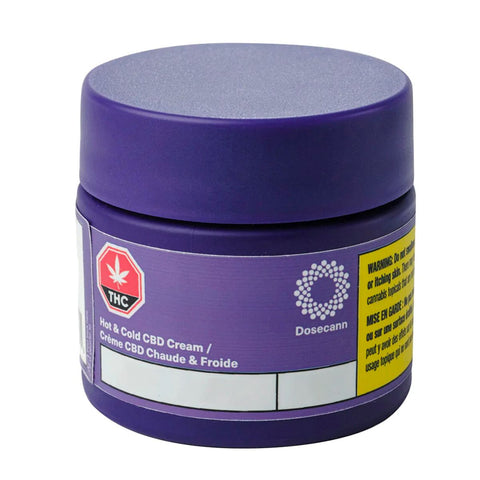#15: High on Relief: How Cannabis Can Help with Chronic Pain
#15: High on Relief: How Cannabis Can Help with Chronic Pain
Anyone who has suffered from chronic pain knows how debilitating it can be. It can disrupt your life, and cause physical discomfort and emotional distress. Even getting out of bed can become a challenge.
If you're one of 8 million Canadians living with chronic pain, you know that it can be hard to cope and manage the symptoms. Traditional treatments often involve prescription medications such as opioids and anti-inflammatory drugs, but they come with their own set of side effects and risks.
Since medical cannabis has been legal in Canada since 2001, there has been a growing interest in the use of cannabis as an alternative treatment for chronic pain. A natural and effective treatment that works for many, cannabis has been shown to reduce inflammation and alleviate pain with fewer side effects than traditional medications.
In this article, we'll explore how cannabis can be used as an effective treatment for chronic pain, discuss different ways to use it, and provide guidance on choosing a quality strain or product.
The benefits of cannabis for treating chronic pain

Defined as pain that lasts for more than 3 months, chronic pain can be caused by a variety of medical conditions such as arthritis, nerve damage, fibromyalgia and inflammatory bowel disease. Fortunately, cannabis has been shown to be effective in relieving the symptoms of chronic pain due to its ability to reduce inflammation and modulate pain signals in the brain.
In a recent Harvard study, researchers suggested that cannabis could be an alternative or adjunctive treatment to traditional medications. Additionally, cannabis has been shown to help with anxiety, depression and insomnia, all of which are common problems for people living with chronic pain.
Cannabis works in a few different ways to reduce chronic pain. The cannabinoids in cannabis interact with receptors located throughout the body's nervous system, helping to modulate the perception of pain by blocking off pathways that carry pain signals to the brain. At the same time, cannabis helps to reduce inflammation in the nervous system, which can help ease pain and discomfort.
The pain-relieving compounds of cannabis

The primary cannabinoids responsible for pain relief are tetrahydrocannabinol (THC) and cannabidiol (CBD). THC is the primary psychoactive ingredient in cannabis that has pain-relieving properties. CBD, on the other hand, does not produce a “high” but has been found to be effective against inflammation and pain. Other cannabinoids like cannabigerol (CBG) and cannabinol (CBN) have also been found to have anti-inflammatory properties.
In addition to cannabinoids, terpenes are also an important part of cannabis’ therapeutic properties. Terpenes are aromatic compounds found in a variety of plants and herbs and give each strain its unique flavour and aroma. For example, pinene has been found to have anti-inflammatory and analgesic properties, while myrcene is known for its sedative effects.
The different consumption methods for chronic pain relief
Depending on your individual needs, there are several options for using cannabis to manage your chronic pain. Here are a few of the most popular methods:
Smoking or Vaporizing: Cannabis can be consumed by smoking or vaporizing dried flower buds or oil concentrates. Smoking or vaporizing is one of the most common methods, and the effects are felt almost instantly for up to 3 hours.
Edibles: Cannabis edibles are a great option if you’re looking for longer-lasting relief. Cannabinoids are absorbed in the digestive tract, so edibles can take up to 2 hours to kick in but can also provide longer-lasting effects for up to 8 hours.
Topicals: Creams, lotions and balms infused with cannabis are perfect for targeting localized pain. Cannabis topicals can provide relief for up to 3 hours, and some may also help soothe symptoms such as inflammation and itching.
Capsules and Tinctures: Getting a measured dose of cannabis is easy with capsules and tinctures. Capsules take up to an hour to kick in, while tinctures can provide relief in as little as 10 minutes. Expect 5 to 8 hours of relief when using either of these methods.
Finding the right cannabis strain or product for pain relief
When deciding on what type of cannabis to use, it’s important to consider your individual needs. The type of strain or product you choose will depend on your symptoms and the intensity of your pain. Here are some options to help you make the right choice:
Sativa: If you're looking for an energizing and uplifting effect, Sativa strains are a great choice. Known for their stimulating properties, Sativas can help reduce fatigue or depression associated with chronic pain.
Indica: Indica strains are often used at night, as they tend to be more relaxing and sedating. They also provide body-numbing effects, which makes them great for managing chronic pain.
Hybrid: Get the best of both worlds with a hybrid strain. Hybrids can be energizing and uplifting while also providing relief from chronic pain and inflammation.
CBD: Strains that are high in CBD and low in THC are best if you’re looking to minimize the psychoactive effects of cannabis while still experiencing cannabis' pain-relieving properties.
Terpenes: Look for high-terpene strains to get the full therapeutic benefits of cannabis. Myrcene, caryophyllene, terpinolene, and pinene are some of the most common terpenes found in cannabis and have anti-inflammatory, analgesic and mood-enhancing qualities.
Uncovering the pain-relieving benefits of cannabis
Cannabis has been shown to be an effective and natural treatment for chronic pain. With the ability to reduce inflammation and alleviate pain through its primary cannabinoids, THC and CBD, as well as its terpenes, cannabis offers a variety of options for managing chronic pain. Whether you decide to smoke, vape, eat edibles, use topicals or take capsules and tinctures, cannabis can be an effective tool for managing your chronic pain. It may take some experimentation to find the right strain or product for your individual needs, but with a bit of patience and research, you’ll find the perfect fit for managing your chronic pain.













